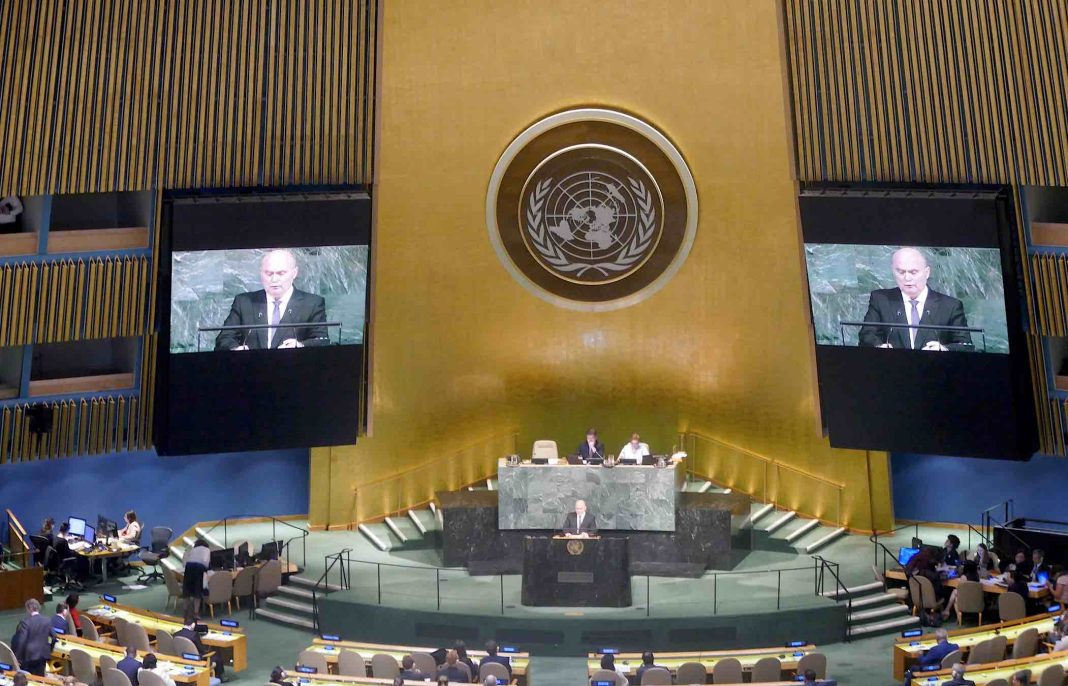By Janet Ekstract
NEW YORK- On Tuesday, the 77th Session of the United Nations General Assembly officially opened with a speech from its new President of the 77th UN General Assembly, Hungarian diplomat Csaba Korosi, who urged world leaders to seek collaboration during difficult times and to focus on meeting the most urgent global challenges, especially the war in Ukraine. Korosi emphasized that “deep divides” must be overcome by building bridges to achieve new understanding. He also said that the UN’s purpose is to be “a well of solutions” and commented: “Responding to humanity’s most pressing challenges, demands that we work together, and that we invigorate inclusive, networked, and effective multilateralism and focus on what unites us.”
UN Secretary-General Antonio Guterres congratulated Korosi on his presidency while also emphasizing what Korosi said. Guterres commented: “We face a world in peril across our work to advance peace, human rights and sustainable development” and also called for solidarity on the part of world leaders in solving the most pressing challenges faced in the 21st century. The secretary-general said the focus for world leaders going forward must be “Debate, Deliberation, Diplomacy. These eternal tools represent the best pathway to a better, more peaceful world.” Guterres implored that the 77th General Assembly Session must be a transformative moment “for people and planet alike.”
Korosi pointed out that what’s happening in Ukraine is a “turning point” and a warning for the entire world to become hypervigilant about Russia’s methodology in its warfare or risk the same type of invasion becoming what he termed a “toolkit of international life.” He stressed: “This war must be stopped. It kills people, it kills development, it kills nature and kills dreams of millions.” Korosi also highlighted the extreme risk of nuclear weapons being used is “now higher than in the past 40 years,” adding, “This ominous reality calls all of us to unite around the issue of disarmament. Korosi made the correlation between climate change and conflicts, especially if natural resources become scarce.
Two major areas Korosi highlighted are the global water crisis and the pandemic, citing the water crisis “as our next greatest threat.” He pointed out global climate disasters such as wildfires, extreme flooding and heatwaves, making it clear “that the world cannot go back to ‘business as usual’” after the pandemic. He also cited severe food insecurity, extreme energy prices, record inflation and global supply chain disruptions as major issues that must be dealt with immediately. As Korosi commented: “We will not be returning to the old normal. The only way to achieve better outcomes is to transform. The contours of the transformation we need are already known. The Agenda 2030 for Sustainable Development, the Sendai Framework, the Paris Agreement and Our Common Agenda, all point us in the right direction. What remains to be seen is whether we will deliver.”
He said his intention during his UN Assembly presidency will be to push for “solutions through solidarity, sustainability and science.” Korosi stressed it’s crucial to further enhance the role of science in the UN body’s decision-making. The new president’s pledge as he commented: “I will work to foster measurable progress in the sustainability transformation – and cultivate the solidarity we need to achieve breakthroughs or to avert future disasters. Taking stock of the Sustainable Development Goals (SDGs) is simply not enough. We need to have more science by our side if we want to realize the Goals by 2030.” Korosi also pledged to getting involved in a much more direct way with civil society partners, academics, private sector along with researchers and practitioners to lend solutions that are rooted in facts, verified information and science. He further stated: “We must also reach out actively to young people, engaging them in what we do so that when they sit in these seats, they can come with better plans and better ideas than we did.” Korosi said the effort to create a United Nations Youth Office is crucial to meet current and future global challenges.
| ReplyForward |




